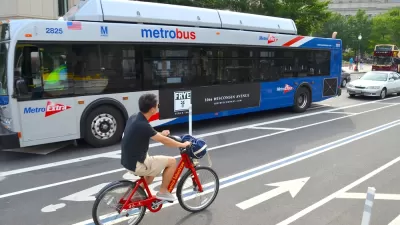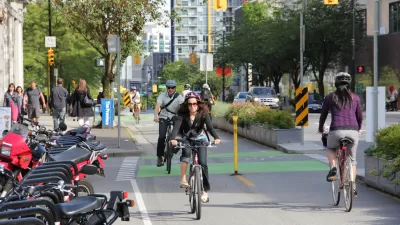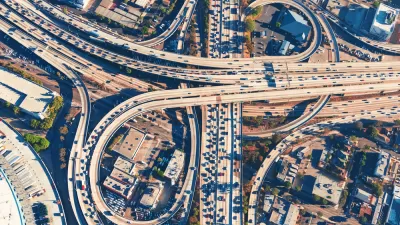The mode share for bikes in urban environments around the world currently sits around 6 percent. A new report out of a university located in one of the most bike-friendly cities in the country quantifies the benefits of 10 percent mode share.
Bobby Magill reports: "The climate would benefit in a big way if urban commuters worldwide would leave their cars at home and use those dedicated bike lanes to cycle to work, and if more cities would prioritize bike commuting in their urban planning, according to a University of California-Davis report [pdf] published Thursday."
More specifically: "Greenhouse gas emissions coming from motor vehicles in big cities worldwide would dive about 11 percent, saving society $24 trillion in infrastructure and other costs between today and 2050 if city dwellers would use bicycles and electric bikes for about 10 percent of their urban trips instead of using motor vehicles, the report says."
Magill quotes Lewis Fulton, co-author of the study, who says that the report is the first to quantify "the potential carbon dioxide and cost savings associated with a worldwide shift toward much greater use of cycling in urban areas."
Complicating the widespread adoption of biking in different cities are disparate funding, infrastructure, and cultural challenges. Kevin Krizek, director of the University of Colorado-Boulder’s Environmental Design Building program, is quoted in the article saying that "Bicycling has widely varying social connotations in some cultures and painting it as a silver bullet that is irrespective of these cultures leaves a lot of distance to cover..." The article surveys more acadmics, including those unaffiliated with the study, for their opinions on the feasibility of such an ambitious goal for mode share.
FULL STORY: Shifting Gears to Cycling Would be Big Climate Boost

Alabama: Trump Terminates Settlements for Black Communities Harmed By Raw Sewage
Trump deemed the landmark civil rights agreement “illegal DEI and environmental justice policy.”

Planetizen Federal Action Tracker
A weekly monitor of how Trump’s orders and actions are impacting planners and planning in America.

The 120 Year Old Tiny Home Villages That Sheltered San Francisco’s Earthquake Refugees
More than a century ago, San Francisco mobilized to house thousands of residents displaced by the 1906 earthquake. Could their strategy offer a model for the present?

Ken Jennings Launches Transit Web Series
The Jeopardy champ wants you to ride public transit.

BLM To Rescind Public Lands Rule
The change will downgrade conservation, once again putting federal land at risk for mining and other extractive uses.

Indy Neighborhood Group Builds Temporary Multi-Use Path
Community members, aided in part by funding from the city, repurposed a vehicle lane to create a protected bike and pedestrian path for the summer season.
Urban Design for Planners 1: Software Tools
This six-course series explores essential urban design concepts using open source software and equips planners with the tools they need to participate fully in the urban design process.
Planning for Universal Design
Learn the tools for implementing Universal Design in planning regulations.
Clanton & Associates, Inc.
Jessamine County Fiscal Court
Institute for Housing and Urban Development Studies (IHS)
City of Grandview
Harvard GSD Executive Education
Toledo-Lucas County Plan Commissions
Salt Lake City
NYU Wagner Graduate School of Public Service





























